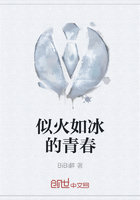Grandet had opened his knife, and was about to apply it to the gold.
"Father!" cried Eugenie, falling on her knees and dragging herself close to him with clasped hands, "father, in the name of all the saints and the Virgin! in the name of Christ who died upon the cross! in the name of your eternal salvation, father! for my life's sake, father!--do not touch that! It is neither yours nor mine. It is a trust placed in my hands by an unhappy relation: I must give it back to him uninjured!""If it is a trust, why were you looking at it? To look at it is as bad as touching it.""Father, don't destroy it, or you will disgrace me! Father, do you hear?""Oh, have pity!" said the mother.
"Father!" cried Eugenie in so startling a voice that Nanon ran upstairs terrified. Eugenie sprang upon a knife that was close at hand.
"Well, what now?" said Grandet coldly, with a callous smile.
"Oh, you are killing me!" said the mother.
"Father, if your knife so much as cuts a fragment of that gold, I will stab myself with this one! You have already driven my mother to her death; you will now kill your child! Do as you choose! Wound for wound!"Grandet held his knife over the dressing-case and hesitated as he looked at his daughter.
"Are you capable of doing it, Eugenie?" he said.
"Yes, yes!" said the mother.
"She'll do it if she says so!" cried Nanon. "Be reasonable, monsieur, for once in your life."The old man looked at the gold and then at his daughter alternately for an instant. Madame Grandet fainted.
"There! don't you see, monsieur, that madame is dying?" cried Nanon.
"Come, come, my daughter, we won't quarrel for a box! Here, take it!"he cried hastily, flinging the case upon the bed. "Nanon, go and fetch Monsieur Bergerin! Come, mother," said he, kissing his wife's hand, "it's all over! There! we've made up--haven't we, little one? No more dry bread; you shall have all you want--Ah, she opens her eyes! Well, mother, little mother, come! See, I'm kissing Eugenie! She loves her cousin, and she may marry him if she wants to; she may keep his case.
But don't die, mother; live a long time yet, my poor wife! Come, try to move! Listen! you shall have the finest altar that ever was made in Saumur.""Oh, how can you treat your wife and daughter so!" said Madame Grandet in a feeble voice.
"I won't do so again, never again," cried her husband; "you shall see, my poor wife!" He went to his inner room and returned with a handful of louis, which he scattered on the bed. "Here, Eugenie! see, wife! all these are for you," he said, fingering the coins. "Come, be happy, wife! feel better, get well; you sha'n't want for anything, nor Eugenie either. Here's a hundred /louis d'or/ for her. You won't give these away, will you, Eugenie, hein?"Madame Grandet and her daughter looked at each other in astonishment.
"Take back your money, father; we ask for nothing but your affection.""Well, well, that's right!" he said, pocketing the coins; "let's be good friends! We will all go down to dinner to-day, and we'll play loto every evening for two sous. You shall both be happy. Hey, wife?""Alas! I wish I could, if it would give you pleasure," said the dying woman; "but I cannot rise from my bed.""Poor mother," said Grandet, "you don't know how I love you! and you too, my daughter!" He took her in his arms and kissed her. "Oh, how good it is to kiss a daughter when we have been angry with her! There, mother, don't you see it's all over now? Go and put that away, Eugenie," he added, pointing to the case. "Go, don't be afraid! Ishall never speak of it again, never!"
Monsieur Bergerin, the celebrated doctor of Saumur, presently arrived.
After an examination, he told Grandet positively that his wife was very ill; but that perfect peace of mind, a generous diet, and great care might prolong her life until the autumn.
"Will all that cost much?" said the old man. "Will she need medicines?""Not much medicine, but a great deal of care," answered the doctor, who could scarcely restrain a smile.
"Now, Monsieur Bergerin," said Grandet, "you are a man of honor, are not you? I trust to you! Come and see my wife how and when you think necessary. Save my good wife! I love her,--don't you see?--though Inever talk about it; I keep things to myself. I'm full of trouble.
Troubles began when my brother died; I have to spend enormous sums on his affairs in Paris. Why, I'm paying through my nose; there's no end to it. Adieu, monsieur! If you can save my wife, save her. I'll spare no expense, not even if it costs me a hundred or two hundred francs."In spite of Grandet's fervent wishes for the health of his wife, whose death threatened more than death to him; in spite of the consideration he now showed on all occasions for the least wish of his astonished wife and daughter; in spite of the tender care which Eugenie lavished upon her mother,--Madame Grandet rapidly approached her end. Every day she grew weaker and wasted visibly, as women of her age when attacked by serious illness are wont to do. She was fragile as the foliage in autumn; the radiance of heaven shone through her as the sun strikes athwart the withering leaves and gilds them. It was a death worthy of her life,--a Christian death; and is not that sublime? In the month of October, 1822, her virtues, her angelic patience, her love for her daughter, seemed to find special expression; and then she passed away without a murmur. Lamb without spot, she went to heaven, regretting only the sweet companion of her cold and dreary life, for whom her last glance seemed to prophesy a destiny of sorrows. She shrank from leaving her ewe-lamb, white as herself, alone in the midst of a selfish world that sought to strip her of her fleece and grasp her treasures.
"My child," she said as she expired, "there is no happiness except in heaven; you will know it some day."















